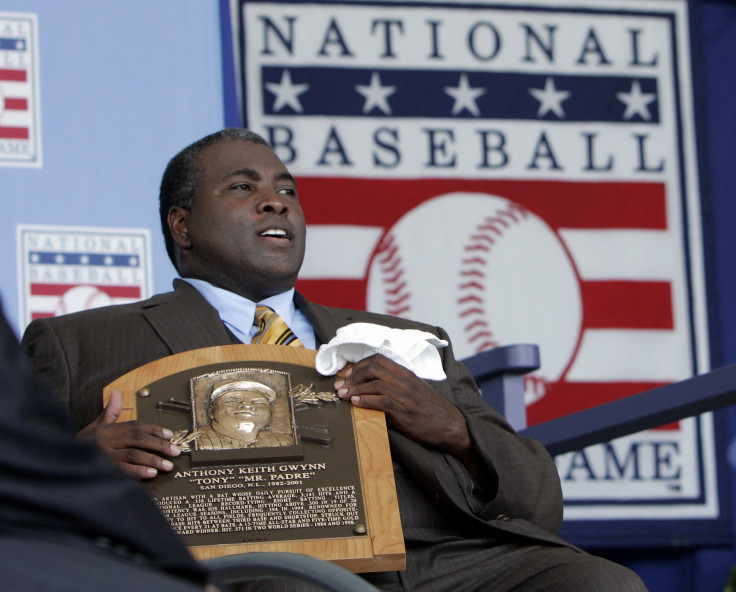Tony Gwynn Death Revives Baseball Insiders' Smokeless Tobacco Debate

Health advocates are calling for a ban on chewing tobacco following the untimely death of Hall-of-Famer Tony Gwynn. Critics hope that the beloved player's passing will be a wake-up call, but the practice has long been a part of baseball culture.
“It’s a huge thing in the baseball world,” UCLA outfielder Ty Moore told the Los Angeles Times. “When you ask an outsider about baseball, they think of [sunflower] seeds and tobacco. It’s part of the culture.’
Gwynn died Monday at age 54 after battling salivary gland cancer. Every year, more than 8,000 Americans due from oral cancer, out of 40,000 diagnosed, according to the Oral Cancer Foundation.
Joe Garagiola, the broadcaster and former major-league catcher, has renewed his call to ban the habit from Major League Baseball.
“I just wish that they would take a more serious look at it and don’t wait for good people to die, good guys like Tony Gwynn,” he told Bloomberg. “That’s a big loss for baseball.”
In 1994, Garagiola agreed to chair the National Spit Tobacco Education Program hoping to raise awareness and encourage early diagnosis of tobacco-related health problems, and lobbied Major League Baseball to ban the distribution of tobacco products in clubhouses.
“I have spent countless house urging Major League and minor league players to stay away from smokeless tobacco -- or as I call it, spit tobacco,” he said in a 2010 public statement, in which he petitioned the House Committee on Energy and Commerce Subcommittee on Health to ban Major League personnel from using and possessing tobacco products in ballparks and during travel.
“Calling it smokeless tobacco is a subtle commercial," he said. "It is spit tobacco.”
While Americans have been smoking less tobacco in recent years, the use of smokeless tobacco has remained steady, according to a new study from the Centers for Disease Control and Prevention. Tobacco smoking rates fell from 22.1 percent to 19.1 percent between 2005 and 2010, while smokeless use has stayed relatively the same, around three percent.
“Cigarettes have been at the forefront of attention because they are the most harmful and the most deadly product out there, but there’s been a lot of efforts in the public health community, and cigarette smoking rates are going down, but we don’t see equal reduction in smokeless tobacco,” Lucy Popova, from the Center for Tobacco Control Research and Education at the University of California, San Francisco, told Reuters.
The study’s authors said a person’s job may influence whether they use smokeless tobacco. For instance, about 19 percent of people working in mining use the product, and eight percent of construction workers. Its use was also highest among white males between the ages of 25 and 44 years old who live in the Midwest and South.
Altria Group Inc., the largest seller of tobacco in the U.S., saw a 5 percent increase in sales last year, according to Bloomberg data. Smokeless tobacco accounted for about a tenth of that.
Despite the newfound attention on the issue, players may be slow to change their minds about the time-honored habit.
“We’re old enough to make decisions, and we know what the final outcome of this is,” Mets second baseman Daniel Murphy told The Wall Street Journal. “It’s not news if something happens to you.”
© Copyright IBTimes 2024. All rights reserved.






















